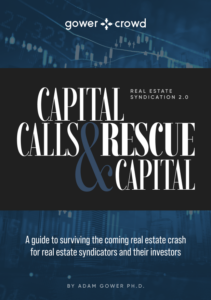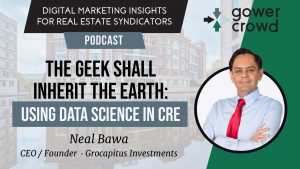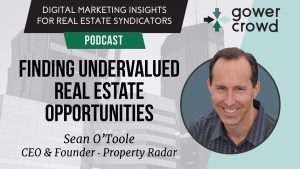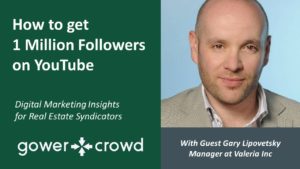Podcast Episode 319: Neal Schaffer
How to Crowdfund Real Estate Using Influencer Marketing

Neal helps businesses navigate their transformation to digital sales and marketing through consulting, training, and helping enterprises large and small develop and execute on social media marketing strategy, influencer marketing, and social selling initiatives.
He is fluent in Japanese - as am I 🙂 - and travels frequently to Japan where he advises Japanese companies on their US market entry strategy.
Neal is especially knowledgeable about influencer marketing and in this podcast shares some really actionable steps to using influencers in real estate crowdfunding.
See below for more links to Neal's online profiles.
What You're Going to Learn
* How real estate developers can use influencer marketing
* What you need to know about posting on Facebook
* How to accelerate your capital raising through influencers
* How to find the best influencers
* [Script] Pitching to an influencer
* Why you should fear not being on social media
* Why online syndication is all about content
And much, much more.
Listen To or Watch the Full Podcast Here
Show Highlights
Accelerate Your Capital Raising Through Influencers
Neal: The potential for crowdfunding is huge and the potential for a new demographic to educate them on this opportunity, because they don't have any legacy ... They don't remember the stock crash of 1989 or '88, like some of us with our Lehman Brothers, what have you, right? They've only seen 10 years of growth. How do we get in on this? I think it's an opportunity ...
There's a lot of things you can do organically. Content's going to be important. Having a robust digital presence is important. Influencer marketing allows you to accelerate past this 10 years of social media that you might not have done. This is why startups that just focus on influencers, like on Instagram, they kick butt over really, really big brands, who are afraid to do it, don't do it. They're still stuck in their past social-media marketing. They want to maintain their brand.
There's plenty of opportunity, but that's why collaboration can really help you accelerate your efforts. The thing, though, is you're a very niche industry. You've got to find people that are well-trusted, especially when talking about money. You have to find people that are willing to talk about this, because they're already talking about financial instruments or real estate, for instance, and they have an audience that is wealthy enough to take their advice [cross talk]
Adam: What is the process for doing that? I mean, you understand this industry [cross talk] how do you find people like that, and then how do you approach them? What's the conversation that you have?
Neal: Here's the thing, Adam ... I was asking you beforehand, how are people doing these deals? Whenever you reach out to an influencer, it's all about WIIFM - What's in it for me. A lot of influencers want their own product, right? You're not going to put an influencer's name on a project that you're developing out in Montana, or wherever it is, but influencers also do something called affiliate marketing, which is commission-based. If you were not to do social media, if you were to go into your community and try to find new deals, you would hire a salesperson who might get zero salary, but 50-percent commission, whatever it is, or maybe five or 10 percent, because you have really, really large deals.
Working through those sort of monetary considerations, because, guess what? Anybody who is doing financial blogging or real estate blogging, they probably have those relationships in place. I know we're talking industrial- commercial, not residential, but they may already have a real estate license. They may be getting a commission. They may be a financial planner or a financial analyst, someone that's certified that actually gets comped every time someone goes from their Instagram post to their website, clicks, and ends up investing.
These are the sorts of things that, in my honest opinion, I would want you to have an army of influencers out there talking about your projects, talking about your company, waiting for you to announce your next project, so that they can get in line. The only way to do that is to provide incentive for influencers. I'm not talking about the mommy blogger who is going to go, "Hey, click this, and get five cents off your next deal at Target." It is a very, very special group, and it's probably not a lot of people, either.
That's why I think you need to combine that with sharing more content. The content, I think, for the companies [inaudible] is going to be educating the market. Just like, Adam, you schooled me on this brand-new industry. If you have a 401k, what have you, if you have $25,000, you can invest, right? I think that's a small enough amount that a lot of people probably have; a lot of working professionals have, but nobody knows about the options.
I can do a one-year CD on an internet bank, maybe get 2.5 percent. That's not bad. I could get the same with a 30-day treasury, or I can do the stock market, but we know it goes up and down, or there's other opportunities. Everybody knows about residential real estate, especially in Irvine, California, where I live, and the many foreign nationals that have bought real estate on my street, but a lot ...
Nobody knows about this industry, and that's why I think a combination of education, together with creating these collaborative relationships where there is some sort of incentive is going to be the golden combination. The education is really key, because, organically, if you educate well, and you're not selling, and you do the right things to get discovered, and maybe a little bit of paid social, it can be a good complement, so that the influencer's talking about you, and then people go to your profile, and they see you don't even have a profile ... I mean, you need to have a presence, right? You need to be ...
Either you're on the board or you're not. That would be, I think, the really golden combination. The influencer is always going to give their perspective. You want to be the authority, and that's where the content comes in. I like the idea of having both pieces for this digital transformation, but the influencer piece, once you find those people, can be extremely valuable and really help accelerate your efforts.
How to Find The Best Influencers
Adam: How do I find the best potential influencers online for what I want to do?
Neal: This is where the hardest part comes in. You got to do a little data-crunching. If I was looking for information on investments, where would I go? If I was looking for information on real estate investment, where would I go? If I was looking for information on alternative investments, where would I go?
You first need to begin with keywords. What are the keywords that ... If you've worked with Adam, and you already have a website, then you already know your keywords, but if you haven't, you need to figure out what are those keywords that I want to be found for, that if someone is looking for alternative investments on Google, then they better find me, because I think that we'd be a good fit for them?
If you can find those, go through the top 100 Google search results for every one of those keywords. Maybe it's only five keywords, right? See who is talking about what you do, and therefore, from that, you're going to find things like Intuit.com. You're going to find big sites, big media sites. They're extremely influential, so they are influencers, but they're not people, and they may not work with you. They're going to be pay-to-play-
Adam: Companies are people, aren't they? I thought [cross talk]
Neal: Well, we're all people at the end of the day, but people that work inside businesses, dealing with people that work inside ... You need to find, out those 500, I'm going to assume 10, 20, 30 ... You're going to find some bloggers, or some people that maybe have their own investment firm; small investment firm. They just re-sell mutual funds. I don't know. They are content creators and talking about this subject matter, because part of it's going to be education. That's why you want to point them to your website, and say, "Hey, let me help you understand the potential here, so that you can educate your clients, and together, we can make a lot of money."
Adam: When you talk about WIIFM, first of all, is there a way of saying ... Is that a (sounding it out) WHIFF-EM-
Neal: No.
Adam: Or do you just W-I-I-F-M? just say W-I-I-F-M, okay-
Neal: -what's in it for me ... Whatever you want to call it. My background's more B2B sales and that's what-.
Adam: Everyone wants to know that. All right, let's say we've done our homework, and we've found, let's say, 50 [cross talk]
Neal: -don't stop at Google. Go on to the social networks. Put these in hashtags - #alternativeinvestment. Do searches on LinkedIn, on Twitter; even try Instagram. I don't think you're going to find much on Instagram. You'll probably find more on Twitter. You'll find some on LinkedIn. You'll probably find someone Facebook and Instagram.
Once you do that, you're going to get a feel as to who is talking about this subject matter that is important to us, and when they talk about it, do they actually get engagement, especially on the social networks? This should give you a list of people; it may be 100, it might be 1,000, but it's a sale, right? Not everyone's going to convert, so you want to have more people on the list than less [cross talk]
Adam: What's the first contact? What do say to somebody on that list? You've got 100 people ... "Hey, can I give you some money to promote my deal?" I mean, how do you do it?
Neal: Not so fast.
[SCRIPT] Pitching to an Influencer
Neal: You found the people. How relevant ... You actually have to go through and look through their content. Would this person, based on their background, their profile, the About Me page, and what they are talking about, is there going to be a potential interest?
If there is, and those of you watching would know better than I would, "Hey, I saw you post about real estate investment trusts. I'm sure you've heard about crowdfunded commercial real estate developments. I represent one of the leading companies. We do approximately 20 projects a year. As you know, the laws have changed. We really love your content. You're really smart, and this sort of opportunity appeals to smart people like you.
We're looking for people to collaborate with online, on your blog, on the social network of your choice, because we think that educating your community about our product is going to help them. It's going to help you. It's going to help us. It is a win-win-win. Do you have 15 minutes for a phone call, so that we can get to know you better and discuss how we might be able to work together?"
The problem that a lot of people do is ... It's like going to ... We're men, right? Assuming that we are heterosexual, going to a female at a bar and saying, "Hey, I know it's the first time we've met, but I want to take you out to a Greek restaurant, and then we'll go out to a movie afterwards," without actually knowing what their interests might be, right?
Adam: Right.
Neal: That's the problem ... I get this a lot from brands, "Hey, we'd love to offer you a $25 Visa gift card if you post about our new ..." It's like, look, the product's irrelevant, and I'm not going to do anything for $25. Why are you nickeling and diming me, if you're this billion-dollar brand? I don't want to do business with you anymore.
Here's the thing that people forget - when you reach out to these people, others are reaching out to them. Everybody who is watching this is going to start doing this, and, if they're smart, they're going to start reaching out to people. These people are getting pinged by a lot of other investors, firms, what have you. You want to make sure that what's in it for them is so important, because if you hit them the wrong way, like you send them an automated, impersonal mail, it's forever going to give them a bad impression of your company.
This is what I want to make sure you avoid, because content creators and influencers, they'll say bad things about companies, in social media, that brush them the wrong way. So, you want to start off as a friend. If you reach out to them the way that I just mentioned ... I think you should be a little bit shorter in your conversation, if you could, but if you reached out in that authentic way, "We're going to help educate you, if you have time. It's a great opportunity ..." You're not going to leave a bad impression. If they're busy, or if they're not interested, they won't respond. That's fine. It's a sale. The conversion is the influencer talking about you. That's why you need a big list.
Why You Should Fear Not Being on Social Media
Neal: I know, to a lot of companies that are listening, it can sound scary. It doesn't have to sound scary. It's yourself starting to actually use these networks. You don't have to post anything, but just become a member and just check it out. Do searches. Look at what people are talking about. I think, over the course of time, you begin to get more of a feel, especially when you see someone ...
I'll never forget, one of my clients was an auto dealer ... I shouldn't say an auto dealer. He's a former auto dealer who provides auto-dealer training. He's like, "I just want to work on LinkedIn, because we want to use LinkedIn to sell to auto dealers." I'm like, "Okay, but let's take a look at Twitter and look what people are talking about." His company was one of the leading auto-dealer training companies in the world. When we did a Twitter search, there was a photo that someone took of their colleague who was asleep at one of their auto-dealer trainings from his company. You could see this CEO just go, "Oh, my God! What's going on here?! We need to be on Twitter!"
I want you to avoid ... People might already be talking about your company. I don't know, but the best defense against this is to actually have a presence, where you can actually converse with those people, send them a private message. "Hey, if you have any questions about our company, let me know," whatever it is. At this point, I would fear staying off the networks more than being on them and what might happen, because at least you have a presence, you have a voice.
If you see something, if someone talks to you, you can take it offline. "Let's have a phone call ..." At this point, there's no fear. There's only fear of not making enough money that your competitors might make. Therefore, I think it just really is in your best interest, but you need to be educating, not advertising, and you need to be collaborating, not marketing. That's where the content and the influencers come into play.
This is Why Online Syndication is All About Content
Adam: Have you seen any other industries that are similar to this blue-ocean world that we're looking at now in real estate? Have you seen any others using influencers effectively that are similar; that are not looking to sell a $25 widget, or whatever it is?
Neal: Well, yeah. This gets down to B2B influencer marketing, where businesses are selling products and services - enterprise deals - in the millions, if not tens or hundreds of millions. That's why I think that it's funny, because I do social selling training for one of the largest insurance companies in the United States. I train their salespeople and their agents. Even though it's B2B, learning how to use LinkedIn for sales, for these people, is very similar to a B2B salesperson. They're not going after people that work inside organizations of their clients, but they're going after high net worth individuals, as well as partners in their community that deal with high net worth individuals [cross talk] So, I think it's a very, very similar analogy.
With B2B influencer marketing, a lot of it is related around content. It's finding those people that are leaders that are talking about alternative investments. "The top 10 alternative investment bloggers or influencers, here's their prediction for where you should invest your money next year." This is a content-rich piece that educates the market, but also gives you the ability to reach out to these people, saying, "Hey, we're going to publish this great piece of content. Here's a little bit more about our company."
Even if they're not interested in your company, if you're able to get a quote from them that you can include, and then you let them know, "Hey, we published the content. If you like it, please share it on your network." Maybe not all of them, but maybe one or two of these 10 people will share it, and then you have people from their community going to your website to read the blog content, and then they might find it valuable. It also help serve what we call SEO or search engine optimization. That sort of content piece is ... B2B influencer marketing, they've been doing that for several years now.
The other thing that B2B influencer marketers do really well - Adam, I covered this in the webinar you were at - is events. I don't know if you ever have launched events or educational events, where you tell your community, or you have a meeting and say, "Hey, here's our next project," but why don't you invite influencers to that event that they can cover it, right? Fly them out; put them in a nice hotel, with the expectation that they're going to tweet about it. They're going to post about it. I'd even say, "Hey, all we want you to do is just post three times on Instagram, Twitter or Facebook. We'd love to get ..." It's a great way to get to know them better, as well. You get to meet them in the flesh. Like Adam, I hope to someday, in San Luis Obispo.
Content events - it could be a virtual event. It could be a webinar. I think those are the golden opportunities for ... It's just like B2B. It's about education, because people just do not know about the opportunity. You got to get out there and teach them, and this will give you a great way to utilize influencers, whether it's for web content or whether it's for your event. You're going to kill a few different birds with one stone.
How Real Estate Developers Can Use Influencer Marketing
Adam: Let's talk about influencer marketing. Let's start at a very high level, and then let's brainstorm about how developers might be able to use influencer marketing to raise money online.
Neal: Sure. We are still in the middle of a digital transformation, right? In general. But we have seen that consumers - people, people with money or people without money - everybody has become digital first. This is just general marketing, but I think it's really important to have the same level of understanding. We can't do the same things we did 10-20 years ago and expect them to work today.
It just so happens that the companies that have a lot of money, some of the more progressive companies, like out of Silicon Valley, have been really first into what we call the digital transformation. We normally talk about it in terms of IT, but I think it's equally important for sales and marketing. We've seen marketing become the first, and now we have things like social selling; salespeople using social media to help them gain prospects, what have you.
Over the course of time, as consumers have become digital first, brands and businesses have been trying to play catch-up, and we are still there today. Now, influencer marketing, obviously, is a type of social media. Basically, influencers are content creators. They are content creators- back in the early days, they were bloggers, they were YouTubers. Now, they might be an Instagrammer, they might be a LinkedInfluencer, as LinkedIn calls them. They might be big on TikTok, which probably is not relevant for today, as is Snapchat.
Needless to say, these are people that are content creators, so they have something to say that's of interest to people. They're often experts, and they've developed a community. This community trusts them, so if they say something and recommend something, not everybody is going to go ahead and buy it, but it's going to pique their interest that this person actually made this recommendation.
Why this is important is ... I started my social-media marketing/consulting company back in 2010, in January, when I had ... In the course of two weeks, here in Orange County, California, I had four different- I had a $30 billion asset management company reach out to me. I had UC Irvine reach out to me. I had a residential landscaping company reach out to me. I had a UCI computer science professor, who was working on his own sort of internet technology, reach out to me.
In the course of two weeks, four companies saying, "Look, we know we need to do social media. We don't know what we need to do. We don't know what we don't know, so we need your help." That was 10 years ago, nine years ago. Perhaps in your industry, because, obviously, the laws have only recently changed, you've had to accelerate that digital transformation. This is still something that even some of you listening might still be trying to wrap your hands around. That's okay, because not every business gets it or is doing it well.
What You Need to Know About Posting on Facebook
Neal: As marketers and brands figured out how to do social-media marketing, they started running into a big problem. The big problem is that we have these things called social networks, right? It's social media, but at the end of the day, it's Facebook, who also owns Instagram, and WhatsApp, and Messenger? It's Twitter. It's LinkedIn owned by Microsoft. You have these social networks that are like, "Okay, we've got to turn a profit here ..." All of you listening know more about that than I do. "We have investors now. We're on the stock market ..."
Therefore, they had to monetize what they were doing, and they did that through advertising. The problem is that if they don't get enough advertising revenue, it doesn't work, but if they have too many ads, then when people tune in to social media, they're going to tune out. This is what happened to Myspace, and this is what's happened to other social networks.
I think, Adam, on the webinar you saw me on, maybe I didn't mention this, but I had a chance to tour ... I was invited to tour Facebook headquarters, 1 Hacker Way, and as you leave Facebook headquarters, they still have that old Sun Microsystems sign up because they occupied their campus, and it's a reminder to every employee, very time they go home, "We do not want to become a dinosaur like Sun Microsystems and lose touch with our audience."
To them, the newsfeed is their product. It is crucial that they maintain integrity, so that whenever someone wakes up and goes into Facebook or Instagram, they're not going to see too many ads, and they're going to see content that resonates with them and keeps them coming back day after day.
So, guess what? Should Facebook show your best friend's photo? Should they show your parents' video? Should they show an announcement from someone you went to college with that they just had a baby, or they got a promotion, a job? Or, are they going to show some really, really bad marketing from a brand that's just trying to post a lot on Facebook every day? They're going to limit the visibility in the newsfeed to businesses - companies that have a business page - and they are going to give preference to people. Facebook, we've seen this the most, but every social network is going to go that way. It is supply and demand. It is a limited newsfeed. We can only go to so many posts a day. There's going to be some advertisements, but guess what? The free content is going to be for more and more people.
Now, I want to get the influencer side, because what's interesting is, over the past four or five years, companies are like, "Okay, social media should be free. It's not free, but we'll do paid social. We'll do ads on Facebook, and on Twitter, LinkedIn, YouTube." At that point, it becomes another type of paid media. It's like Google Ads, because whether it's on Facebook or on Google, it's an ad. People see it as an ad. You have ad-blocker software and the whole bit. It's not as trustworthy.
Who gets a lot of engagement, and therefore, if you get engagement on your content in social media ... Instagram is like, "Wow, this person gets a lot of engagement every time they post. I want to show it to more people, because people like it, that's a signal they're going to stay on Instagram longer." Those are the content creators. Those are the people that we call influencers. Therefore, rather than doing a paid advertisement, organically, you might as well just put your hands in the air and give up, right? Rather than doing a paid social advertisement, why don't we collaborate with these influencers that might be relevant to us and find a way to work together for a win-win?
Related to this episode:















